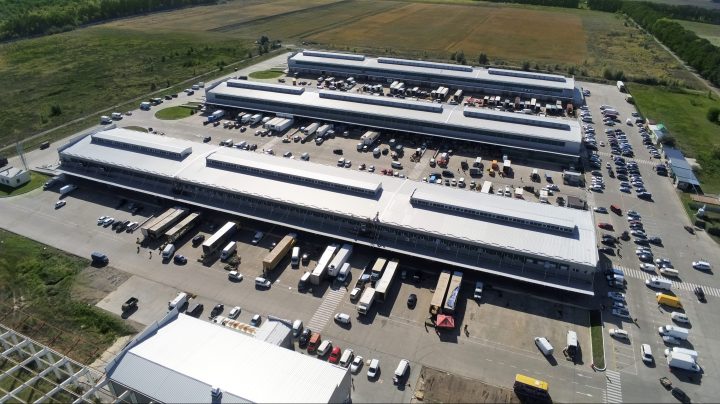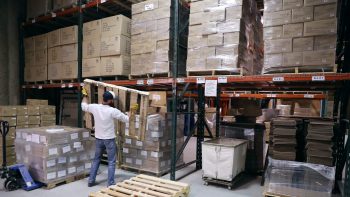
With warehouses full, retailers look to store goods outside
With warehouses full, retailers look to store goods outside

After retailers stocked up during the height of the pandemic, people stopped buying so much stuff. That forced retailers to find somewhere to store all of their excess inventory, filling up most of the country’s available warehouse space.
But a lack of warehouse space hasn’t stopped businesses from finding new places to store their product, even when all of the warehouses are full. Now, many businesses are turning to a new solution: storing goods outside.
This is known as industrial outdoor storage. It’s getting popular, in part, because outdoor storage facilities are flexible.
“You could easily store goods outside,” said Blair Duncan, associate vice president at Realterm, a company that buys outdoor storage facilities and rents them out. “You can have empty trailers, you could have actual vehicles themselves on site as well.”
Duncan said his company recently bought a warehouse in Rancho Cucamonga, California. The property is connected to a large parking lot, where a tenant has parked about 50 truck trailers.
“They’re using only the parking lot, and not the warehouse,” Duncan said. “It’s kind of an interesting dynamic that we’re seeing.”
As a result of running out of warehouse space during the pandemic’s peak, retailers started embracing what’s known in the industry as “warehouse on wheels,” said Lance Theobald, co-founder of SecurSpace, a company that helps retailers find outdoor storage sites.
Over the past few years, Theobald said demand for his service has gone up tenfold — especially from big retailers that need to park goods for the short term.
“They’ve got a ship coming in with a couple hundred containers, they offload that, put it into this lot and pick those as needed, or when they can,” Theobald said.
Traditional warehouses are crowded, in part, because a lot more than just storage goes on inside them now. Clients break down shipments, sort them and repackage them for distribution.
“We moved away from warehousing as a storage activity to these really multifunctional sites,” said Juliann Emmons Allison, a professor at the University of California, Riverside, who’s been researching warehousing in Southern California. “And because of all the things that they’re doing, they had to get bigger.”
As the warehouse industry has expanded, communities in California’s Inland Empire region have pushed back. Allison doesn’t think new industrial outdoor storage facilities would be much more popular.
“I can’t imagine a community being happier to see a bunch of containers stacked in their neighborhood full of goods than it would be to see a warehouse,” Allison said.
Both kinds of storage facilities generate a lot of truck traffic and diesel fumes. They come with other costs to the environment, said Susan Phillips, director of the Robert Redford Conservancy for Southern California Sustainability at Pitzer College.
“When you pave over land, you lose opportunities to do other things with that land,” Phillips said. “You lose opportunities to farm in regenerative ways, you lose opportunities to use your land as a carbon sink. Instead, it becomes a carbon source.”
Outdoor storage doesn’t quite have the same environmental impact as traditional warehouses, Phillips added. Empty lots don’t require much construction, and if the logistics industry slows down, they’re a lot easier to repurpose.
“It doesn’t have to be a warehouse forever, and you’re not going to be stuck with this derelict infrastructure,” she said.
At the outdoor storage facility in Rancho Cucamonga, Realterm’s Duncan said his company focuses on buying existing warehouses that are already connected to big parking lots.
“It’s harder to replicate and build these outdoor storage sites, given prohibitive zoning,” he said. “People don’t want more truck terminals, people don’t want more secure parking facilities. So what we find is that these sites become more and more valuable.”
Throughout the pandemic, Duncan said rents on these outdoor facilities have doubled and even tripled.
There’s a lot happening in the world. Through it all, Marketplace is here for you.
You rely on Marketplace to break down the world’s events and tell you how it affects you in a fact-based, approachable way. We rely on your financial support to keep making that possible.
Your donation today powers the independent journalism that you rely on. For just $5/month, you can help sustain Marketplace so we can keep reporting on the things that matter to you.
















